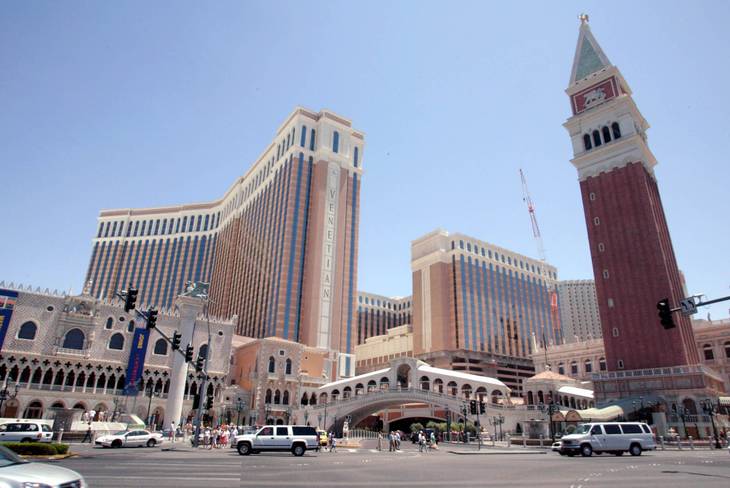Las Vegas Sands Corp., one of three gaming companies that filed regulatory applications to purchase energy on the open market, is ending a formal effort to leave NV Energy but indicated its intention to remain active on the energy issue. That stands in contrast to a decision by MGM Resorts International, which, pending regulatory approval, anticipates exiting in October.
Sands effectively voided its exit application Thursday when it missed a deadline to make a compliance filing with the the Public Utilities Commission of Nevada, which regulates NV Energy. Wynn Las Vegas LLC also plans to exit, but has, in the past, challenged the fees associated with leaving. Regulators said the companies must pay a combined $125 million to exit.
PUC commissioners justified the fees — $86.9 million for MGM Resorts, $15.7 million for Wynn and $23.9 million for Sands — to protect other NV Energy ratepayers from assuming the costs of large customers exiting the utility. The companies consume 7 percent of NV Energy’s service. By leaving NV Energy, the companies would still use the utility for delivery of energy but they would purchase their electricity from an independent supplier rather than directly from the utility.
In filings, Sands had repeatedly disputed the fees that the commission assessed. A lawyer for the company called the fees “exorbitant and unjustified” in one document filed with the commission.
Its decision to forgo its exit does not mean the company is walking away. Ron Reese, a Sands spokesman, declined to get into specifics, but said Sands would “remain active on the issue overall."
A Sands-funded poll this spring asked Nevadans a series of questions about NV Energy and a proposed November ballot measure, known as the Energy Choice Initiative, that would create a competitive electricity market in the state. Reese declined to comment on the initiative but in the past, he has told VEGAS INC that he would neither confirm nor deny that Sands was involved with it. Tesla and Las Vegas data company Switch are the only disclosed backers of the measure.
Even if the initiative is successful, it could be years before companies could take advantage of its effects. The measure does not require the Nevada Legislature to open energy markets until 2023.
As Sands walked away from its application Thursday, MGM Resorts proceeded with its departure.
“After careful thought and analysis over many months, we have concluded our objectives are best met by purchasing the energy required to operate our resorts, and serve our customers and guests, from a source other than NV Energy,” the company’s general counsel wrote in a letter to the PUC.
MGM Resorts said it expects to transition to a third-party energy supplier in October. In a filing with the commission, the company stated that its objectives include reducing its environmental impact, adding more renewable energy sources to its portfolio and decreasing its use of energy.
The company’s plan to exit still requires commission approval.
"We will continue to work with MGM to meet their needs as a transmission and distribution customer of NV Energy,” said Jennifer Schuricht, a spokeswoman at NV Energy.
MGM Resorts is looking to leave NV Energy under a 2001 law that came about during the Western energy crisis and was created when the utility generated less than half its power. Its original intent was to bring in new generation to the state at a time when supply was low. In the early 2000s, a number of Strip properties looked to source electricity from an alternative source.
But casinos are not the only users that have sought to leave NV Energy. Switch, the data company backing the Energy Choice Initiative, applied to exit from the utility in 2014. After the utilities commission denied data company Switch’s exit application last year, the firm, a large and nearly constant consumer of electricity, negotiated a compromise with the utility to rely on renewables.
Like MGM Resorts, Wynn is planning to leave NV Energy. "We are moving forward with the process and plan to exit the grid late this year,” Wynn spokesman Michael Weaver said.
The company submitted a compliance filing with the utilities commission earlier this week. In January, Wynn filed a lawsuit challenging the calculations behind its $15.7 million exit fee. Wynn claimed that the commission’s calculations used “a legally untenable scheme” and were based on skewed assumptions that all three companies would exit.
“Nothing in (the law) empowers the PUC to condition Wynn’s rights on the wants of one of its business competitors simply because these competitors have filed applications within some unspecified ‘close proximity’ to Wynn’s application,” the company’s complaint stated.
In March, Wynn and the PUC agreed to stay the proceedings pending discussions.
